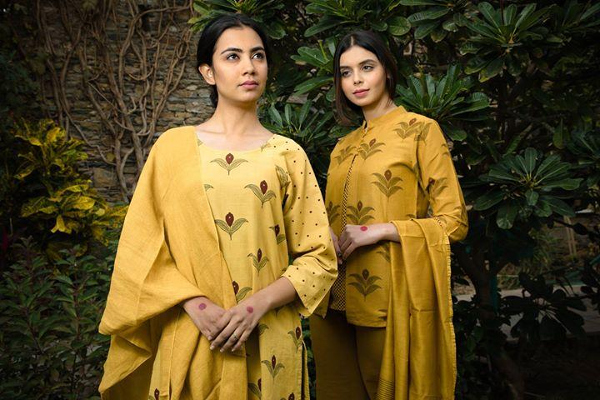We are at an Ayurvastra dyeing centre in Balaramapuram near Thiruvan-anthapuram in Kerala, watching how organic cloth is being treated using Ayurvedic principles. Global Organic Textile Standard-certified organic cotton is scoured in fresh water to clean it, then put into vessels filled with water with a small portion of oil. The fabric is then dried and treated with buffalo milk and cow urine mixed in water—the milk and urine taken from cows and buffaloes fed with herbs—as well as cotton seeds and leaves.
“Scouring is the first step in the treatment of the fabric and the process takes about an hour. When it comes to the oils, we use different oils… say, for well-being we use castor oil and for energy, coconut oil,” says Mr K Rajan, who manages the dyeing centre.
After the treatment with buffalo milk, the fabric goes through the process of gumming, or with a fixing agent for the herbs, and preparing the fabric for dyeing. “About 25 different kinds of plants—used in combinations according to a person’s needs—are applied to the fabric by boiling the fabric in a decoction. For this, the plants are differently prepared—cut, powdered, grained, juiced or pasted. For one hour, the fabric is constantly stirred and boiled in the decoction,” adds Rajan.
The centre takes the slow fashion route to creating sustainable and ‘herb-infused’ garments and in 2011 also tied up with fashion brand Lecoanet Hemant to create fabric for their sustainable line of clothing that has been permeated with herbs and oils, and is free of synthetic chemicals and toxic irritants. “From the cotton to the treatment, to the ingredients to the threads, to the buttons, everything about Ayurganic is sustainable and comes from nature, and can go back to nature,” says Hemant Sagar, who started Lecoanet Hemant about four decades ago with Frenchman Didier Lecoanet. The brand has several other lines—including Genes Lecoanet Hemant, an online collection and Lecoanet Hemant, a couture line. A few years ago, they decided to create a sustainable clothing line, Ayurganic, tying up with Rajan.
“Sustainability was always our preoccupation and when we came to India, we became profoundly enamoured with the concept of Ayurvastra—a principle so old and so Indian that had been forgotten. Ayurganic as a product is a bridge between the ancient and the present, and between India and the world,” says Sagar.
“Making ayurvedic vastra has been part of our tradition for generations and I plan to pass this down to my next generation. I involve my kids in the whole process to ensure the craft does not die with me,” says Rajan. The process of creating the fabric requires eight hours of work over 15 days for the production of a two-metre length cloth. Extracts of ayurvedic herbs are used in the dyeing process and no synthetic or chemical materials are used at any stage of the process, he says.
They use 48 different plants for the Ayurganic fabric. After gumming, the fabric is washed in the Neyyar river, where the plant pastes used become fodder for fish. The fabric is then left to dry for a few days before being transported to Ayurganic’s studio in Delhi.
The designers make a range of products including pants, bathrobes, shawls, scarves, eye masks and even yoga mats. Considering the dyeing is done with organic substances, the range is currently available only in a butter yellow colour. “We’ve sold a lot of our pieces in Germany, Switzerland, Austria and quite a few in India,” says Sagar.
“Everyone moving towards more natural dyeing processes ensures that chemicals are removed from the supply chain and manufacturing of products, in the longer run ensuring sustainability,” says Kriti Tula, founder of Doodlage, which makes sustainable clothes. “Sustainable fashion is a global movement that needs to be adopted within the fashion industry. Natural dyeing is a great process for sustainable fashion and including it in collections helps in ensuring that polluting chemicals don’t make it into soil or water.”
Dr Nikhil Parmar, a dermatologist at Sparsh Clinic in Ahmedabad, says textiles infused with herbs and natural medications during the dyeing process can be beneficial for people suffering from skin diseases. “If the organic clothes retain their medicinal properties even after long use, they could be beneficial for skin allergies, infections and irritation,” he adds.
Source: Forbes India
Image Courtesy: Ayurvastra by Aavaran
You may also like
-
India Can’t Afford to Remain Stagnant at this Juncture, Says PM Modi; Asks People to Buy Locally-Made Goods
-
Stolen Artefacts to be Returned to India from Scotland Museums
-
Netaji’s Hologram Statue at India Gate
-
10th Century Stone Idol of Goat Head Yogini IllegallyRemoved from A Temple in Lokhari, Banda, UP Being Returned to India
-
UNESCO Inscribes ‘Durga Puja in Kolkata’ on the Representative List of Intangible Cultural Heritage of Humanity
